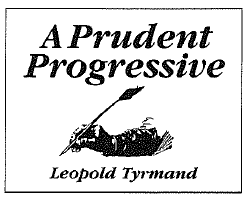A Prudent Progressive
Upwardly mobile young professionals became, suddenly, the intriguing and fashionable term of this political season. Senator Hart, the latest in the long history of electoral meteorites, a rather vapid man who talks a lot without saying much, popularized this designation and so made it apart of the daily news’ vocabulary, for which he should be commended. The phrase is supposed to encompass a relatively new stratum of technological, bureaucratic, and corporate craftsmen, who are primarily involved with the so-called “knowledge” industries: they make a respectable income by knowing about the specialized skills, which, these days, move the economy, sell mass culture, and stimulate megaconsumption. For some never really explained reasons, it has become proper to assume that this large and proliferating group is a nonnegotiable fiefdom of the Democratic party, and that its collective mind is irrevocably suffused with the fumes of liberal faith and prejudice. But is it so?
The coming of age of this social subclass took place during the Vietnam era. A wise woman once told me that one wears throughout one’s life at least one little token of the fashion that reigned at the time when he or she felt giddy and happy. It thus should be reasonably accepted that members of the generation in question will, till the end of their days, be sentimentally responsive to any antiwar and antinuclear slogans, all their attendant antiquated uselessness notwithstanding. Whether this instinctuality will turn into pathology, a stilted Pavlovian recoil syndrome, remains to be seen: after all, radical pacifists who had vowed, during the notorious Oxford Union debate in the 1930’s, never to defend England and monarchy, turned in to the most ferocious RAF fighter pilots just a few years later. Therefore, how many of the Democratic and liberal precepts from the Vietnam period have retained their sway over the composite ego of this group, and how this magic translates itself into body politics, are things which are more obscure than ever. No enlightening—or merely probing—fiction has appeared over the last decade that provides arresting and profound insights into the group’s psychology, ethos, or its comprehensive sense of life’s meaning. Some feminist novels tried to accomplish it, yet all they contain is a kind of feminist socialist realism in which authenticity and truthfulness parallel that found in the Russian tales about Soviet workers and their love for communism. Movies, like the recent Big Chill attempted to give some insight in the group’s process of maturation and its incorporation into the classic American mechanism of dignified conformity that so smoothly had swallowed countless prior rebellions of souls and mores; however, both the Big Chill’s introspection and conclusion are tepid, unmoored from any system of coherent thinking, from any systemic concept of existence and the world.
All of this indicates that the young, upwardly mobile, urban professionals may be presently at the point of transition where, like many before them, they rediscover a need for precise notions that guide human endeavors, ambitions, hopes. Therefore, shouldn’t we, as intellectual codifiers, talk to them, convincingly, about the order of existential pursuits, the normative system of social and personal ethics, and about a society that would produce its own binding moral code that is rooted in meaningful traditions of decency and rationality? Consequently, we could see a welcome translation of social ideology into political influence and electoral votes. The fashion ads in popular magazines clearly indicate a reborn yearning for a hierarchy of emotions, authority of feelings, sexual etiquette, for civility and comity instead of grooviness and funkiness, for a stylized and decorative behavioral norm. They are ready to respond to those who apply calm reason and seminal, low-key irony to the affairs of the contemporaneity, who seek the salvation of society, country, and individual life in the accumulated and updated riches of Western, Judeo-Christian civilization. From that perspective, Mr. Hart emerges as a bit of a primitive spokesman for their identity and their imagination. It soon will become quite clear that whether or not he has enough beef to offer them is immaterial. They need vision. Both personal and civic.

Leave a Reply